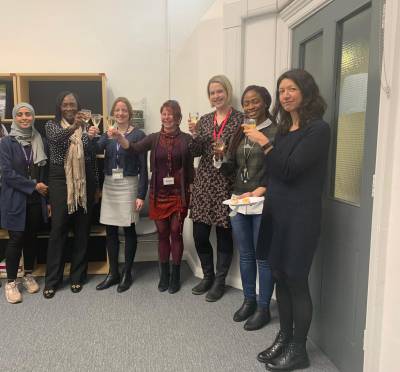UCL IRDR dPHE receives UK IT Awards Commendation
12 November 2020
The Centre for Digital Public Health in Emergencies (dPHE) at the Institute for Risk and Disaster Reduction was 'highly commended' for its GADSA project in the category of 'Healthcare Project of the Year' at the UK IT Awards!

Highly Commended: UCL Centre for Digital Public Health in Emergencies
This commendation highlights the hard work and innovative thinking behind the dPHE's Gamified Antimicrobial Stewardship (AMS) Decision Support App (GADSA). Working with surgeons in Nigeria, the app successfully improved the prescribing of antibiotics and the quality of healthcare services in Nigeria and has received funding to explore a pilot project in the UK with the NHS University College Hospital (UCH).
The UK IT Industry Awards highlights excellence throughout the IT industry. Although this year's awards were done virtually, the 2020 cohort of nominees and winners were typically impressive in a variety of categories, from 'Inspirational Individual of the Year' to 'Sustainable Organisation of the Year'.
Our team at dPHE recieved a 'highly commended' award and should be incredibly proud of this acknowledgement. Congratulations to all our colleagues at dPHE and everyone involved in this GADSA project!


The GADSA Project:
Many deaths caused by infectious diseases in lower-income countries could be avoided by better infection prevention and appropriate prescribing of antibiotics. The challenge of the GADSA innovation was to improve antibiotic prescribing and increase compliance with guidelines amongst surgeons in Nigeria through behaviour change by developing a persuasive mobile gamified decision support app, integrating the latest evidence on best-practice localised to Nigerian settings, and evaluating it at the point of care in three hospitals.
GADSA offers a very powerful and engaging tool to boost prescribing success and encourage professionals to keep using the app. Offering a point of care decision tool that can be rapidly updated to reflect changes in evidence and policy, GADSA mobile technologies demonstrated it has the power to change clinical practise.
This project has the potential to improve not only the compliance of prescribing, but quality of care and the time required of healthcare professionals.
The dPHE interdisciplinary team working with committed and highly skilled colleagues in Nigeria enabled this innovation success. Through co-authoring with surgeons in Nigeria, they developed a localised decision tree algorithm based on the World Health Organisation (WHO) guidelines.
A series of co-design focus groups attended by surgeons informed selection of evidence-based behaviour change components and gamification features for inclusion in the GADSA app (e.g. a ‘mentor’ providing positive/negative feedback on user decisions to reinforce learning - red/green). An amusing outcome of the co-design with Nigerian surgeons was the selection of a 'dog' as a mentor for the persuasive game, rather than (as expected) any human avatar/mentor.

The 'mentor' in the GADSA app, decided upon by focus groups with Nigerian surgeons (the end users), here provides risk analysis and guidance on medical procedures.
Impact of GADSA:
The success of improved prescribing using the GADSA app has substantially improved the quality of healthcare service. In particular, almost 300 prescriptions were recorded by the app: 69% non-compliant decisions about the risk of the procedure were changed following feedback and 10-15% non-compliant decisions on the type and length of antibiotic prescriptions were also changed after feedback. Delivering a prescription behaviour change at the point of care is a unique result which we can expect to lead to further scaling up of the project in the near future.
Click on the following link to read more about the dPHE's GADSA project!
 Close
Close

